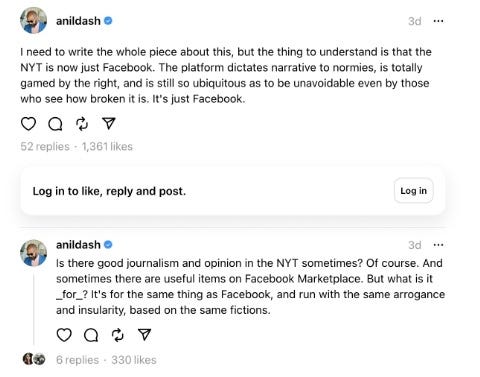Monday 15 January, 2024
In flight
Two of my kids, on a memorable day on the Mayo coast, way back in 2004.
Quote of the Day
”There’s no underestimating the intelligence of the American public.”
H.L. Mencken
As we may be destined to discover in November.
Musical alternative to the morning’s radio news
Muireann Bradley | Candyman (Jools’ Annual Hootenanny)
A gifted Donegal teenager who was one of the discoveries of 2023. A kid who really understands the blues.
Long Read of the Day
Inside My Dark Room
A really lovely essay by Julie Park in the Los Angeles Review of Books.
This is how it begins…
I felt cornered. A colleague had given me his comments on the manuscript for my academic book in progress about the camera obscura as a model for interiority and interior space in 18th-century England, and he didn’t like my argument. As a senior white male, this colleague had a significant measure of power over me, a woman of color who was junior to him professionally. He was considered one of the gatekeepers in our field; at the time, I was relying on him to write me letters of recommendation for jobs and fellowships.
My colleague said that the focus on the camera obscura in my argument worked to conceal my book’s “true” topic. According to him, this was the discourses on empiricist philosophy surrounding 18th-century literature. I suspect its fault lay also in departing from his preferred critical orientation and failing to cite him, among other colleagues, in the process. This was my second book, yet his feedback made me seem like a disobedient child. Clearly, I could no longer rely on him to support me in my professional endeavors unless I changed my book to more closely reflect what seemed to be his own way of thinking and writing, jettisoning my focus on the camera obscura. I didn’t want to.
In Latin, camera obscura means “dark room.” As the name suggests, the basic features of a camera obscura are easy enough to grasp: the visual device projects images of the external world onto a wall in a dark room via a ray of light coming through a hole on the opposite wall. Yet its fundamental mechanism can be explained in even simpler terms: in the fourth century BCE, Aristotle described how, during an eclipse, he caught sight of the way images of the sun appeared on the ground between the leaves of a tree…
Horrified by Horizon? Then get ready to be totally appalled by AI
My Observer OpEd on the Post Office scandal.
It doesn’t take much imagination to describe what happens when a large corporation, over 16 long years, is allowed vindictively to prosecute 900 subpostmasters for theft, false accounting and fraud, when shortfalls at their branches were in fact due to bugs in the accounting software imposed on them by that corporation, as “one of the greatest miscarriages of justice in our nation’s history”.
But then Rishi Sunak is not the most imaginative of men. The US Marines, on the other hand, have an economical term that fits the Horizon fiasco like a glove: it was a “clusterfuck” – primly defined by the Cambridge Dictionary as “a very rude word for a complete failure or very serious problem in which many mistakes or problems happen at the same time”.
Horizon was the product of a flawed and sometimes clueless IT procurement system to which the British state has for decades been addicted. The system eventually procured – from an offshoot of ICL owned by the Japanese giant Fujitsu – was a sprawling, computer bug-filled monster…
My colleague Tim Adams has a terrific article on the scandal in the same issue. And Andrew Rawnsley, in his column, explores the way the British political establishment ignored the injustices and allowed the toxic corporation at the heart of it to prosper.
My commonplace booklet
Clearly I’m not the only person who is increasingly pissed off by the New York Times.






